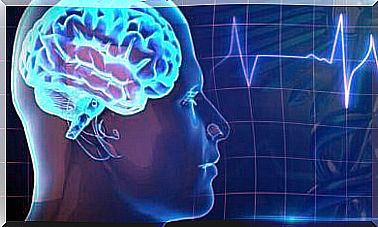Tension Headache: What Are Its Causes And Treatments?

We all know how unpleasant it can be to have a headache. This malaise prevents us from performing most of our daily tasks effectively, since we feel a discomfort that usually robs us of energy. Unfortunately, we’ve all been through this at some point in our lives. Although there are many types and versions of headaches, tension headache is one of the most common.
It is a type of headache that appears due to excessive tension in the muscles of the neck and scalp. It is estimated that these exaggerated muscle contractions cause 78% of headache cases in the world. These cases are also often associated with problems such as depression, anxiety or stress, although they can affect almost anyone.
Although this type of pain doesn’t usually cause more problems than a simple annoyance, tension headache can become something relatively serious if it persists for a long time. In this article, we’ll tell you what the main causes of this problem are and what can be done to address it.
What exactly is a tension headache?
Most people who suffer from this problem describe the feeling of having a band squeezing their head. They feel generalized pain and not very strong, but it can be very unpleasant. Generally, a headache of this type will not prevent the person from performing their tasks in the usual way, but it will produce a feeling of tiredness and malaise, so that the person does not feel completely well.

Although it is not known exactly why tension headaches occur, what is known is that there are several factors that act as a predisposition for its onset:
- Episodes of stress, anxiety or depression that are not punctual, which persist over a period of time.
- Insomnia or lack of adequate rest for several days in a row.
- Strain your eyesight for extended periods. This can happen, for example, when looking at a screen for a long time in a fixed way or not using glasses even if you have myopia.
- Poor posture when sleeping or sitting, which causes stiffness in the neck region.
Tension headaches usually appear less than 15 days of each month. If its frequency is higher than that, it is considered that the person is already facing another type of disorder, such as a chronic headache. Although this can also be caused by stress, it is usually classified as a different problem.
How to Treat Tension Headache
The most important secret in treating tension headaches is finding out why exactly it is occurring. If it is possible to discover this, we will be able to know what will be the most effective way to treat it so that it disappears. To that end, you can ask yourself the following questions:
- What happened differently in the days before the headache appeared?
- Are you experiencing a lot of stress lately? If your life is already stressful, has there been an intensification in the last few days?
- Did you strain your neck or back muscles in any way? This can happen, for example, when performing intense physical exercise.
- Have you been in unnatural postures for the body for a long time?
- Forced use of sight beyond normal? For example, staring at a computer or cell phone screen for a long time.
Depending on the answers to these questions, you may be able to adopt different strategies to fight tension headache. For example, if you have identified that the problem may be related to a recent increase in negative emotions, which have become excessive, you can try using relaxation techniques to lessen the negative impact of stress on your body.
On the other hand, if you think that your headache is being caused by physical factors (such as poor posture or an overload in certain muscles), it may be that you change your habits and be more attentive to everyday postures and movements. be enough.

Do I have to go to the doctor?
Tension headache is generally not a cause for major concern. In some cases, however, it is necessary to look for a professional to verify that there is no major problem behind it. Some of these cases are as follows:
- The headache becomes very intense.
- The headache appears very suddenly.
- Problems associated with loss of balance or speech difficulties arise .
- The need arises to take painkillers frequently, more than 3 days a week.
In such cases, the best option is to see a doctor. On most occasions, however, the tension headache goes away on its own. Other than that, it can be understood as a warning from your own body that you have to change some aspect of your life that is being problematic.









